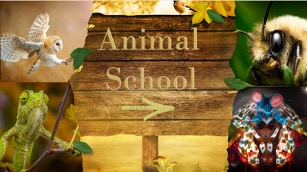A Mental Health Analysis of An Animal School: A Tale of Gifts Film
What do the beloved characters Gharial, Sugar Glider Possum, Margay, Okapi, Peacock Mantis Shrimp, and Bumblebee all have in common? They are all bright, neurodivergent students who are, unfortunately, not thriving at the Animal School. Some of them are suffering silently without anyone knowing. Why?
Peek into their worlds in this short metaphorical story, An Animal School: A Tale of Gifts, written by Lin Lim and Adam Laningham. Created for educators and parents of 2e, neurodiverse, and gifted children. View the film: https://youtu.be/r4etWS0emb0
Gharial’s School Experience (Video 1:02 – 2:02)
Gharial is an example of what can happen when remediation focuses on deficits (climbing) instead of a twice-exceptional student’s talent (swimming). Time taken from Gharial’s love of swimming stripped away much of Gharial’s happiness and can create negative repercussions for mental health, motivation, self-efficacy, and self-esteem.
“I must be broken.”
“I will never be good enough.”
“My talents aren’t as important.”
Parents and educators should advocate a strength-based approach and support enrichment activities that build positive self-efficacy rather than only remedial interventions.
Sugar Glider Possum’s School Experience (Video 2:04 – 3:02)
Sugar Glider Possum flew in a different, natural way and was labeled a failure because the school did not accept neurodiverse approaches. A school environment that encourages cognitive differences fosters creativity and problem solving; no single approach works for all children.
Some gifted students may arrive at correct answers without showing steps. Expecting identical processes can harm self-concept and self-esteem and increase anxiety and behavioral issues.
Margay’s School Experience (Video 3:03 – 4:10)
Margay appeared typical but processed information much faster. Gifted intelligence can be overlooked when unwanted behaviors draw attention. Gifted children with ADHD may seek stimulation and appear disruptive; without appropriate challenge they become disengaged and can suffer shame and diminished self-esteem.
Provide challenging projects, movement, and interest-driven activities to prevent crashes in self-esteem.
Okapi’s School Experience (Video 4:11 – 5:00)
Okapi may blend in outwardly but be misunderstood inside. Differences not acknowledged by peers and teachers can lead to bullying, social isolation, anxiety, and depression. Teaching neurodiversity and acceptance from a young age helps build self-esteem and prevent stigma and harm.
Peacock Mantis Shrimp’s School Experience (Video 5:04 – 6:12)
Peacock Mantis Shrimp was an outlier with a deep special interest the school did not support. Profoundly gifted and 2e children often require niche environments to develop their expertise. When supported by mentors and appropriate environments, these children can flourish.
Bumblebee’s School Experience (Video 5:05 – 7:14)
Bumblebee illustrated asynchronous development: advanced intellect with lagging social or motor skills. These students may need extra time, accommodations, and understanding. Tolerance, patience, positive relationships, psychological safety, and a strength-based approach support twice-exceptional students and protect self-esteem.
Final Thoughts
Every child’s way of navigating the world is unique. When teachers and parents put talents and abilities first and then provide support for areas of difficulty, children are more likely to find happiness and thrive. Start with the heart.

